Embracing medicinal herb tea rituals can transform your daily routine into a powerful wellness practice. You'll tap into ancient wisdom while cultivating mindfulness through intentional preparation. These rituals offer a natural way to reduce stress, boost your immune system, and connect with nature's healing power. By developing personal tea ceremonies, you'll create moments of tranquility and self-care in your busy life. You can adapt your rituals seasonally, explore diverse cultural traditions, and promote sustainability in your practices. From stress relief to immune support, medicinal herb teas provide a holistic approach to health and well-being. Discover how this simple act can profoundly impact your life.
Ancient Wisdom in Modern Times
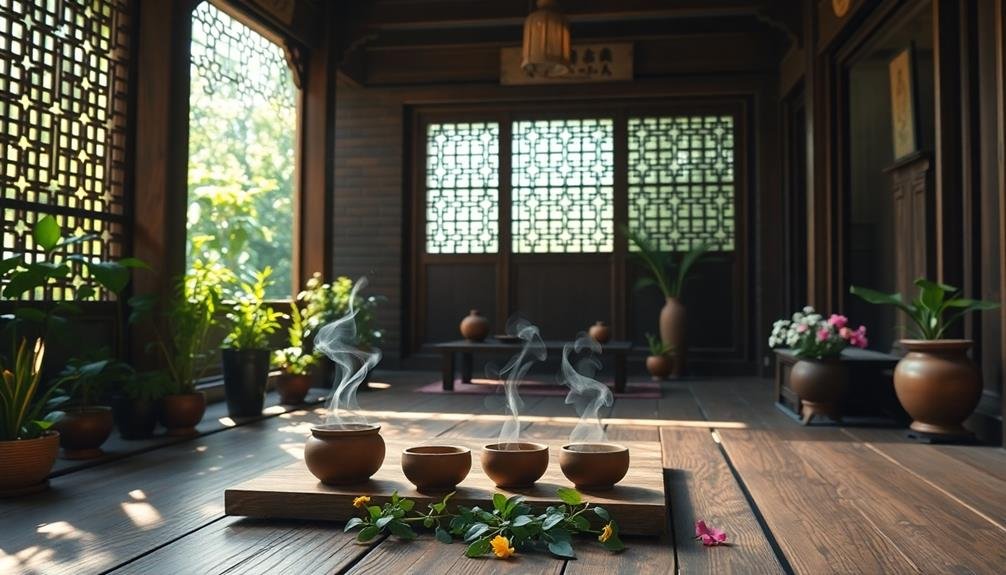
In spite of our fast-paced modern world, ancient herbal tea rituals are making a comeback. You'll find that these time-honored practices offer a wealth of benefits for your physical and mental well-being.
By incorporating medicinal herb teas into your daily routine, you're tapping into centuries of traditional knowledge that's been refined and passed down through generations.
These rituals aren't just about drinking tea; they're about creating a mindful pause in your day. You'll learn to appreciate the subtle flavors and aromas of different herbs, each with its own unique healing properties.
From calming chamomile to invigorating peppermint, you'll discover a wide range of options to suit your needs.
Mindfulness Through Tea Preparation
As you prepare your medicinal herb tea, you're presented with a unique opportunity to practice mindfulness.
Focus on each step of the process, from selecting herbs to pouring hot water, allowing yourself to be fully present in the moment.
This intentional awareness transforms a simple tea-making routine into a meditative ceremony, connecting you deeply with the ancient practice and its healing potential.
Focusing on Present Moment
Preparing medicinal herb tea offers a unique opportunity to practice mindfulness and focus on the present moment. As you engage in this ritual, you're naturally drawn to the sensory experiences unfolding before you. Notice the texture of the herbs as you measure them, inhaling their distinct aromas.
Listen to the sound of water heating in the kettle, observing the gradual rise in temperature. When you pour the hot water over the herbs, watch how they unfurl and release their colors into the liquid. Pay attention to the steam rising from your cup, feeling its warmth on your face.
As you wait for the tea to steep, resist the urge to check your phone or engage in other distractions. Instead, use this time to focus on your breath or simply observe your surroundings.
When the tea is ready, hold the warm cup in your hands and take a moment to appreciate its appearance and fragrance before taking your first sip. As you drink, savor each mouthful, noticing the flavors and sensations on your palate.
This practice of mindful tea preparation can help you cultivate a greater sense of presence and calm in your daily life.
Cultivating Tea Ceremony Awareness
The ancient art of tea ceremony offers a profound path to mindfulness. As you engage in this ritual, you're invited to cultivate a heightened awareness of each step in the process.
Begin by selecting your herbs with intention, considering their medicinal properties and how they align with your current needs. As you measure and blend the herbs, notice their textures, colors, and aromas. Feel the weight of each ingredient in your hand.
When heating the water, listen to the gentle sounds it makes as it approaches boiling. Observe the steam rising and feel its warmth on your skin.
As you pour the water over the herbs, watch how they unfurl and release their essence. Notice the changing color of the infusion and the fragrances that fill the air.
While the tea steeps, focus on your breath and the sensations in your body. When it's time to pour, do so with grace and attention.
As you sip, savor the flavors and warmth. Let each sip be a moment of connection with yourself and the natural world. This practice of tea ceremony awareness can transform a simple act into a powerful meditation.
Connecting With Nature's Healing Power
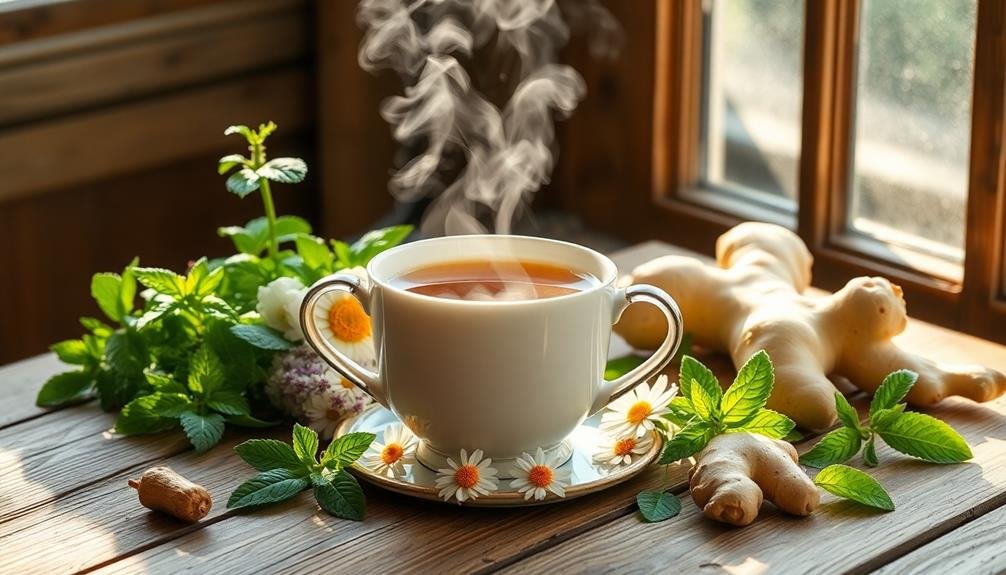
Nature's pharmacy offers a wealth of healing potential through medicinal herbs. When you embrace herb tea rituals, you're tapping into this ancient wisdom and connecting with the earth's natural healing power. Each sip brings you closer to the plants that have been used for centuries to promote wellness and balance.
As you prepare your herbal tea, take a moment to appreciate the plant's journey from seed to cup. Visualize the sun, soil, and water that nourished it. This mindfulness enhances your connection to nature's healing energy.
When you inhale the tea's aroma, you're breathing in the essence of the plant and its therapeutic compounds.
Different herbs offer various benefits. Chamomile can calm your nerves, while peppermint may aid digestion. Echinacea might boost your immune system, and lavender could help you sleep.
Stress Reduction and Relaxation
Stress reduction and relaxation are key benefits of medicinal herb tea rituals. As you engage in the process of preparing and sipping your herbal tea, you'll find yourself naturally slowing down and becoming more mindful. This intentional pause in your day can greatly lower your stress levels and promote a sense of calm.
Certain herbs like chamomile, lavender, and lemon balm are known for their soothing properties. When you incorporate these into your tea ritual, you're not just enjoying a pleasant beverage; you're actively supporting your nervous system. The act of holding a warm cup and inhaling the aromatic steam can trigger a relaxation response in your body.
Creating a regular tea ritual gives you a dedicated time for self-care and reflection. It's an opportunity to step away from the demands of daily life and focus on your well-being.
As you make this a habit, you'll likely notice improvements in your overall stress management and ability to unwind.
Boosting Immune System Function

You can strengthen your immune system by incorporating specific medicinal herb teas into your daily routine.
Antioxidant-rich herbal infusions, like green tea or elderberry, help combat free radicals and support overall health.
Additionally, you'll find that adaptogenic stress-fighting teas and anti-inflammatory herb blends, such as tulsi or turmeric, can further bolster your body's natural defenses.
Antioxidant-Rich Herbal Infusions
While many herbal teas offer various health benefits, antioxidant-rich infusions stand out for their immune-boosting properties. These powerful brews can help protect your cells from damage caused by free radicals, potentially reducing the risk of chronic diseases and supporting overall health.
You'll find a wealth of antioxidant-rich herbs to choose from, including green tea, chamomile, hibiscus, and rooibos. Each of these herbs contains unique compounds that contribute to their antioxidant power. For example, green tea is packed with catechins, while hibiscus boasts anthocyanins and vitamin C.
To maximize the antioxidant content in your herbal infusions, steep your tea for the recommended time and temperature. Oversteeping can lead to a bitter taste and may reduce the potency of some antioxidants.
Consider combining different herbs to create a custom blend that suits your taste preferences and health goals.
Incorporating antioxidant-rich herbal infusions into your daily routine can be an enjoyable way to support your immune system. Try drinking a cup in the morning to start your day or in the evening to wind down.
Adaptogenic Stress-Fighting Teas
The modern world's constant demands can take a toll on our bodies and minds. That's where adaptogenic stress-fighting teas come in, offering a natural way to boost your immune system and combat daily stressors.
These powerful herbal blends contain plants known as adaptogens, which help your body adapt to physical, mental, and environmental stress.
You'll find herbs like ashwagandha, holy basil, and rhodiola in these teas, each working to balance your body's stress response.
Ashwagandha, for instance, can lower cortisol levels and reduce anxiety. Holy basil may improve cognitive function and mood, while rhodiola can enhance mental performance and reduce fatigue.
Anti-Inflammatory Herb Blends
Moving from stress-fighting teas, let's explore another powerful category of herbal blends. Anti-inflammatory herb teas can be your allies in boosting immune system function and reducing overall inflammation in your body.
These blends often combine potent herbs known for their anti-inflammatory properties, helping you combat chronic inflammation that's linked to various health issues.
You'll find these teas particularly beneficial if you're dealing with:
- Joint pain or arthritis
- Digestive problems
- Skin conditions like eczema or psoriasis
- Chronic fatigue or autoimmune disorders
When you incorporate anti-inflammatory herb blends into your daily routine, you're giving your body a natural boost.
Herbs like turmeric, ginger, and chamomile are often featured in these teas, each bringing its unique set of benefits. Turmeric, for instance, contains curcumin, a compound renowned for its powerful anti-inflammatory effects.
Ginger can help reduce muscle pain and soreness, while chamomile soothes the digestive system.
Enhancing Digestive Health
Digestive health plays an essential role in our overall well-being, and medicinal herb teas can be powerful allies in supporting it. You'll find that incorporating specific herbs into your tea ritual can soothe digestive discomfort, reduce bloating, and improve nutrient absorption.
Peppermint, ginger, and fennel are renowned for their digestive benefits. Peppermint tea can relax your gut muscles, easing cramps and nausea. Ginger tea aids in reducing inflammation and stimulating digestion. Fennel tea helps alleviate gas and bloating while promoting healthy gut bacteria.
| Herb | Benefits | Preparation |
|---|---|---|
| Peppermint | Soothes cramps, reduces nausea | Steep 1 tsp dried leaves in hot water for 5-7 minutes |
| Ginger | Reduces inflammation, stimulates digestion | Simmer fresh ginger slices in water for 10 minutes |
| Fennel | Alleviates gas, promotes gut health | Steep 1 tsp crushed seeds in hot water for 7-10 minutes |
To maximize the benefits, drink these teas between meals or 30 minutes before eating. You'll notice improved digestion and reduced discomfort over time. Remember to listen to your body and consult a healthcare professional if you have persistent digestive issues.
Improving Sleep Quality
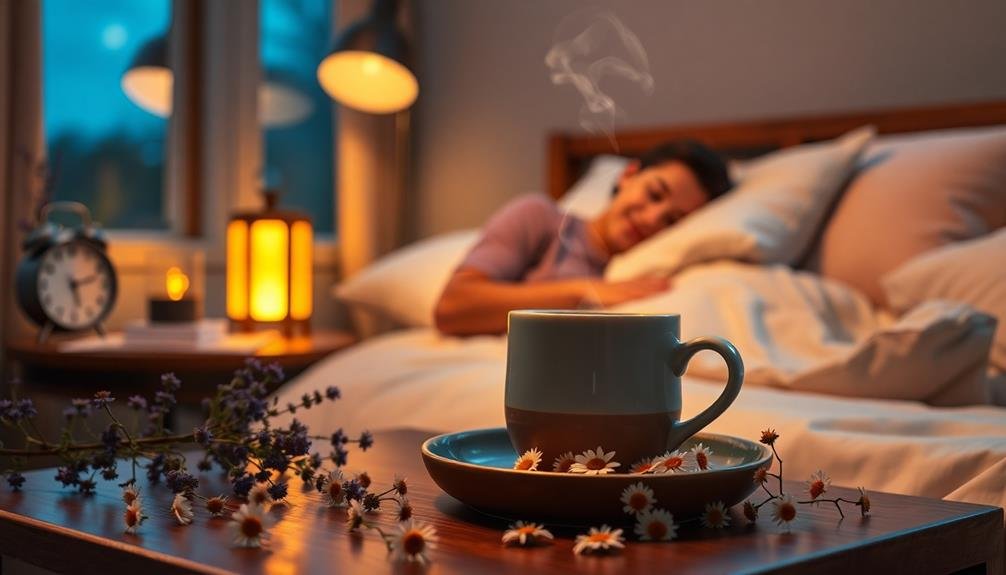
While a good night's sleep is essential for overall health and well-being, many people struggle to achieve it consistently. Incorporating medicinal herb teas into your bedtime routine can greatly improve your sleep quality. These teas contain natural compounds that promote relaxation and help you unwind after a long day.
Chamomile tea is a popular choice for its mild sedative effects, helping to calm your mind and prepare your body for rest. Valerian root tea, known for its sleep-inducing properties, can reduce the time it takes to fall asleep and enhance overall sleep quality. Lavender tea soothes anxiety and promotes deeper, more restorative sleep. Passionflower tea is another excellent option, as it reduces stress and supports a more restful night.
To make the most of your medicinal herb tea ritual for better sleep:
- Choose a tea that suits your needs and preferences
- Brew your tea 30-60 minutes before bedtime
- Sip slowly, focusing on the aroma and warmth
- Create a calming environment to enhance the tea's effects
Cultivating Social Connections
In addition to its health benefits, medicinal herb tea can play an essential role in cultivating social connections. By sharing tea rituals with friends, family, or even strangers, you're creating opportunities for meaningful interactions and bonding experiences. These shared moments can foster deeper relationships and promote a sense of community.
You'll find that preparing and serving medicinal herb tea becomes a catalyst for conversation. As you discuss the various herbs, their properties, and personal experiences, you're opening up channels for genuine communication. This shared interest can bridge generational gaps and cultural differences, bringing people together over a common passion.
Hosting regular tea gatherings can also expand your social circle. You'll meet like-minded individuals who share your interest in herbal remedies and wellness. These connections can lead to new friendships, professional networking opportunities, or even potential romantic relationships.
Moreover, the act of serving tea to others is a gesture of care and hospitality. It demonstrates your willingness to nurture and support those around you, strengthening existing relationships and laying the foundation for new ones.
Exploring Herbal Flavor Profiles
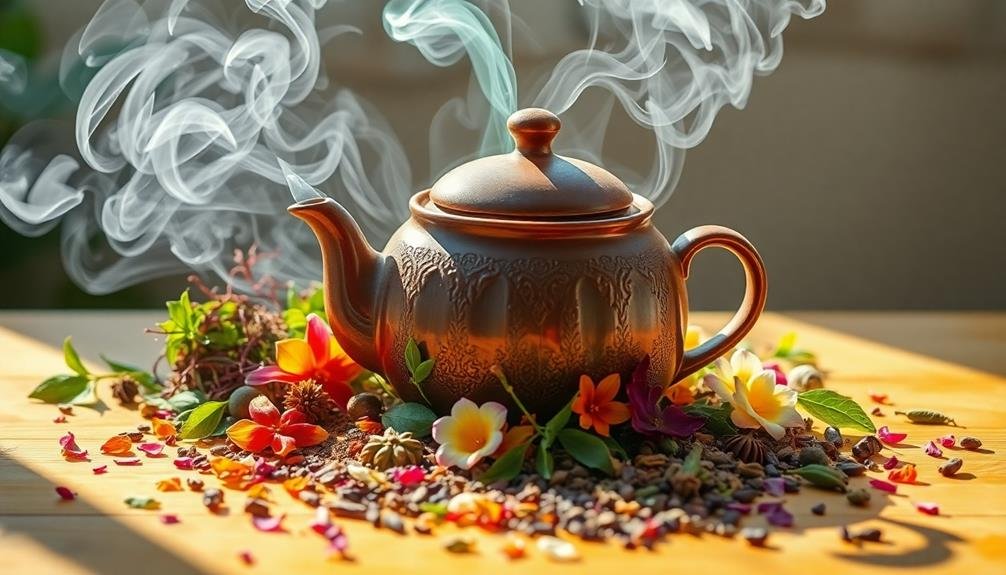
As you explore herbal flavor profiles, you'll discover a rich spectrum of tastes ranging from sweet and floral to bitter and earthy.
You can enhance your understanding by creating a taste chart, categorizing herbs based on their dominant flavors and noting subtle undertones.
Taste Spectrum Analysis
Delving into the world of herbal teas, you'll discover a rich tapestry of flavors that span the entire taste spectrum.
From sweet and floral to bitter and earthy, each herb brings its unique profile to your cup. Understanding these flavor nuances can help you create more balanced and enjoyable blends.
When analyzing herbal tea flavors, consider these key taste categories:
- Sweet: Herbs like licorice root, stevia leaf, and chamomile offer natural sweetness.
- Bitter: Dandelion root, yarrow, and milk thistle provide a pleasant bitterness that can aid digestion.
- Spicy: Ginger, cinnamon, and peppermint deliver warming, invigorating notes.
- Floral: Lavender, rose petals, and hibiscus contribute delicate, aromatic qualities.
Pairing Complementary Herbs
Understanding the taste spectrum of individual herbs opens up exciting possibilities for creating harmonious blends. As you experiment with pairing complementary herbs, you'll discover how different flavors can enhance or balance each other, resulting in a more complex and satisfying tea experience.
Start by categorizing herbs based on their dominant taste profiles: sweet, bitter, pungent, sour, or astringent. You'll find that combining herbs from different categories often yields the most interesting results. For example, pair a sweet herb like licorice root with a bitter one like dandelion to create a balanced flavor.
Or, mix pungent ginger with sour hibiscus for a zesty, invigorating blend.
Consider the medicinal properties of herbs when pairing them. Some combinations can amplify therapeutic effects, while others may counteract each other. Research potential interactions before blending.
Also, pay attention to the strength of each herb's flavor. Use stronger-tasting herbs sparingly to avoid overpowering more delicate ones.
As you develop your blending skills, you'll create unique, personalized tea rituals that not only taste great but also support your health and well-being.
Developing Personal Tea Rituals
Creating your own tea ritual can be a deeply personal and rewarding experience. It's an opportunity to connect with nature, nourish your body, and cultivate mindfulness. As you develop your ritual, consider the time of day, location, and ambiance that best suits your needs.
You'll want to choose herbs that align with your health goals and personal preferences, whether you're seeking relaxation, energy, or specific medicinal benefits.
To establish a meaningful tea ritual, focus on these key elements:
- Preparation: Set aside dedicated time and create a peaceful environment
- Intention: Define your purpose for the ritual, whether it's healing, relaxation, or self-reflection
- Mindfulness: Engage your senses fully in the process, from brewing to sipping
- Consistency: Practice your ritual regularly to reap the full benefits
As you refine your tea ritual, you'll discover what works best for you. Don't be afraid to experiment with different herbs, brewing methods, and timing.
Your ritual may evolve as your needs change, so remain open to adjusting your practice. Remember, the goal is to create a moment of tranquility and self-care in your day.
Seasonal Adaptations for Wellness
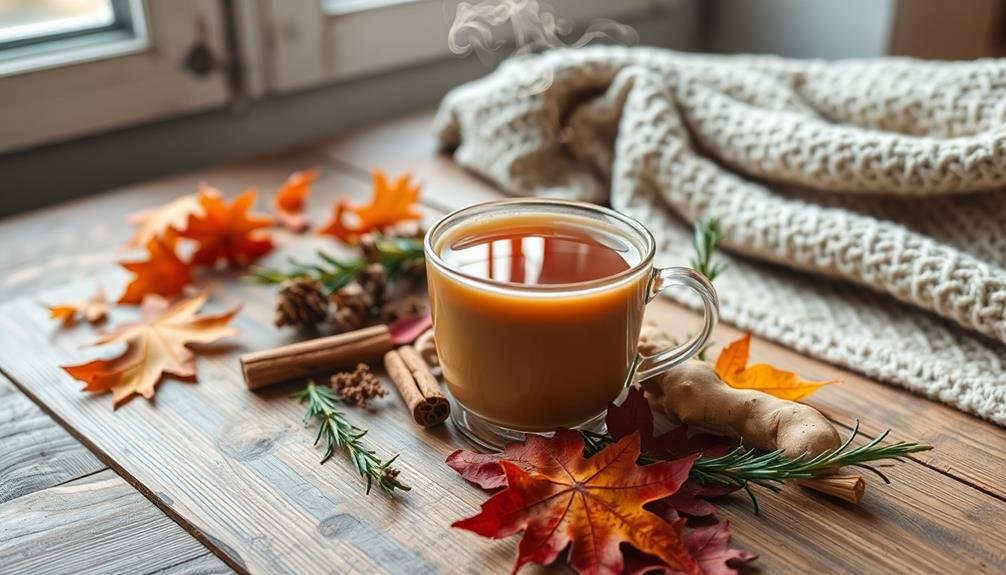
As the seasons change, so should your medicinal herb tea rituals. Adapting your tea choices to the current season can help support your body's natural rhythms and boost your overall wellness.
In spring, focus on detoxifying herbs like dandelion root and nettle to cleanse your system after winter. These teas can help stimulate your liver and support gentle detoxification.
Summer calls for cooling herbs like peppermint and hibiscus. They'll help you stay hydrated and refreshed during hot days.
As autumn approaches, switch to immune-boosting blends with echinacea and elderberry to prepare for cold and flu season. These herbs can strengthen your body's defenses against seasonal illnesses.
In winter, warming spices like ginger and cinnamon can improve circulation and provide comfort. They're also great for supporting digestion during heavy holiday meals.
Don't forget adaptogens like ashwagandha or holy basil, which can help your body cope with seasonal stress year-round.
Cultural Appreciation and Exchange
Through the lens of medicinal herb tea rituals, we can explore and appreciate diverse cultural traditions. As you investigate these practices, you'll discover a rich tapestry of customs and beliefs that span the globe.
You'll find that many cultures have their own unique approaches to herbal medicine and tea ceremonies, each offering valuable insights into wellness and community.
By engaging in cultural exchange through herb tea rituals, you'll:
- Broaden your understanding of different healing traditions
- Learn new preparation techniques and flavor combinations
- Gain respect for the wisdom passed down through generations
- Foster connections with people from various backgrounds
As you explore these rituals, you'll notice how they often reflect a culture's relationship with nature, spirituality, and social bonds.
You might encounter the Japanese tea ceremony's focus on mindfulness, or the South American tradition of sharing mate tea as a symbol of friendship.
By embracing these practices, you're not only enriching your own wellness journey but also contributing to cross-cultural understanding and appreciation.
Remember to approach these traditions with respect and openness, recognizing the deep cultural significance they hold for many people around the world.
Sustainability in Herbal Tea Practices
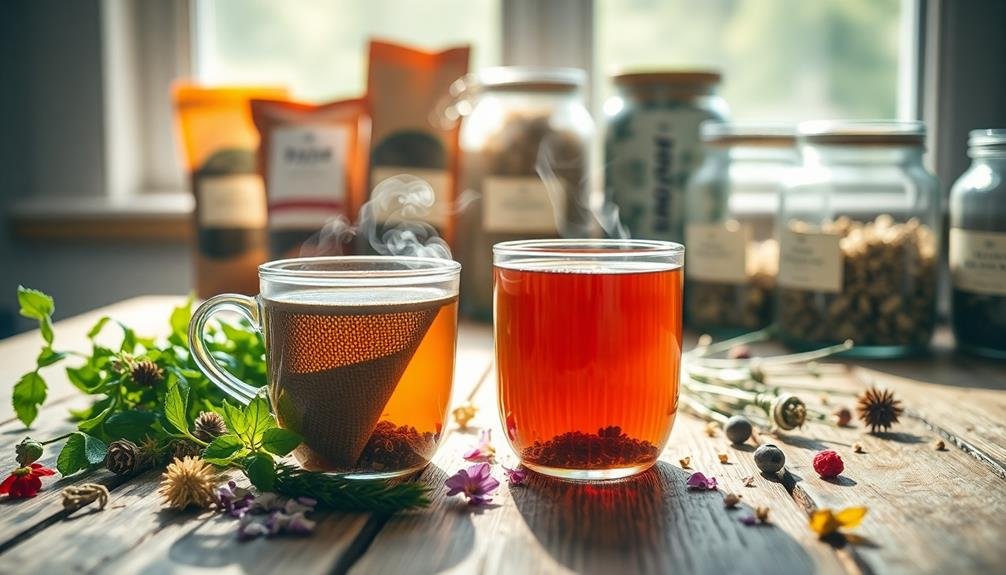
Sustainable practices have become increasingly important in the world of herbal tea rituals. As you embrace these rituals, consider the environmental impact of your choices. Opt for organic, locally sourced herbs whenever possible to reduce your carbon footprint and support eco-friendly farming practices.
Growing your own herbs is an excellent way to guarantee sustainability and connect more deeply with your tea ritual.
When purchasing tea, look for brands that use biodegradable or compostable packaging. You can also buy herbs in bulk to minimize waste. Don't forget to compost your used tea leaves and herbs, returning nutrients to the soil. If you're using tea bags, choose those made from natural, unbleached materials.
To conserve water and energy, only boil the amount of water you need for your tea. Consider using a thermal carafe to keep your tea warm instead of repeatedly reheating it.
Frequently Asked Questions
Are There Any Potential Side Effects of Drinking Medicinal Herb Teas Regularly?
While generally safe, regular consumption of medicinal herb teas can have side effects. You might experience allergic reactions, interactions with medications, or digestive issues. It's best to consult a healthcare professional before incorporating them into your daily routine.
How Do Medicinal Herb Teas Interact With Prescription Medications?
You should be cautious when mixing medicinal herb teas with prescription meds. They can interact, potentially altering drug effectiveness or causing side effects. Always consult your doctor or pharmacist before combining them with your medications.
Can Children and Pregnant Women Safely Consume Medicinal Herb Teas?
You should exercise caution when giving medicinal herb teas to children or pregnant women. It's best to consult a healthcare provider first, as some herbs can interact with medications or affect development. Always prioritize safety when considering herbal remedies.
What's the Difference Between Fresh and Dried Herbs in Tea Preparation?
You'll find fresh herbs offer a vibrant, immediate flavor in your tea, while dried herbs provide a more concentrated taste. Fresh herbs need more quantity but have a shorter shelf life. Dried herbs are convenient and long-lasting.
How Long Can Prepared Medicinal Herb Teas Be Stored?
You shouldn't store prepared medicinal herb teas for long. It's best to drink them fresh, within 24 hours. If you must, refrigerate for up to 3 days, but remember, their potency and flavor will diminish over time.
In Summary
You've discovered the power of medicinal herb tea rituals. By embracing these practices, you're tapping into ancient wisdom, cultivating mindfulness, and connecting with nature's healing. You'll reduce stress, boost your immune system, and develop personal rituals that adapt to the seasons. As you explore different cultural traditions, you're also promoting sustainability. So brew that cup, take a deep breath, and let the herbs work their magic. Your body and mind will thank you.

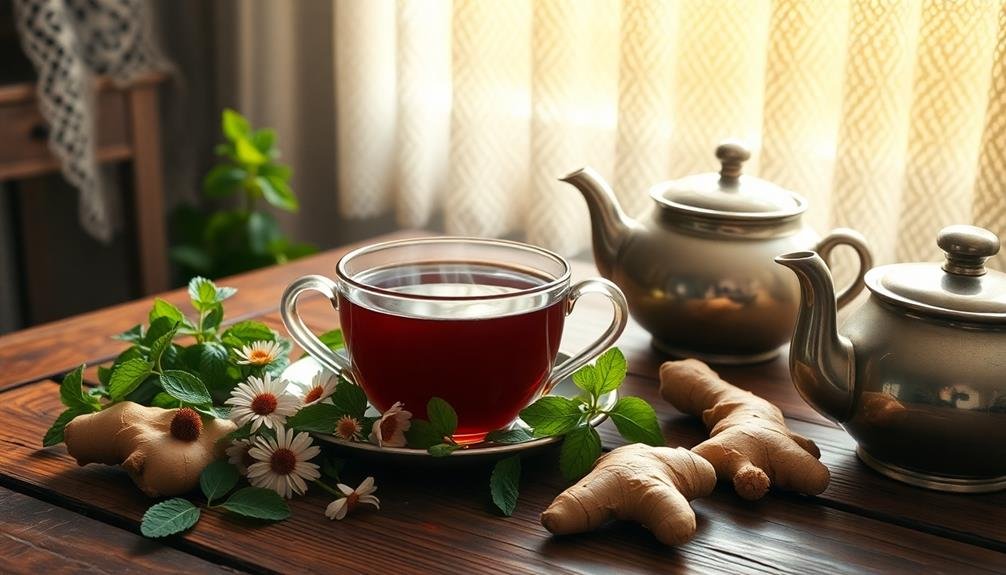

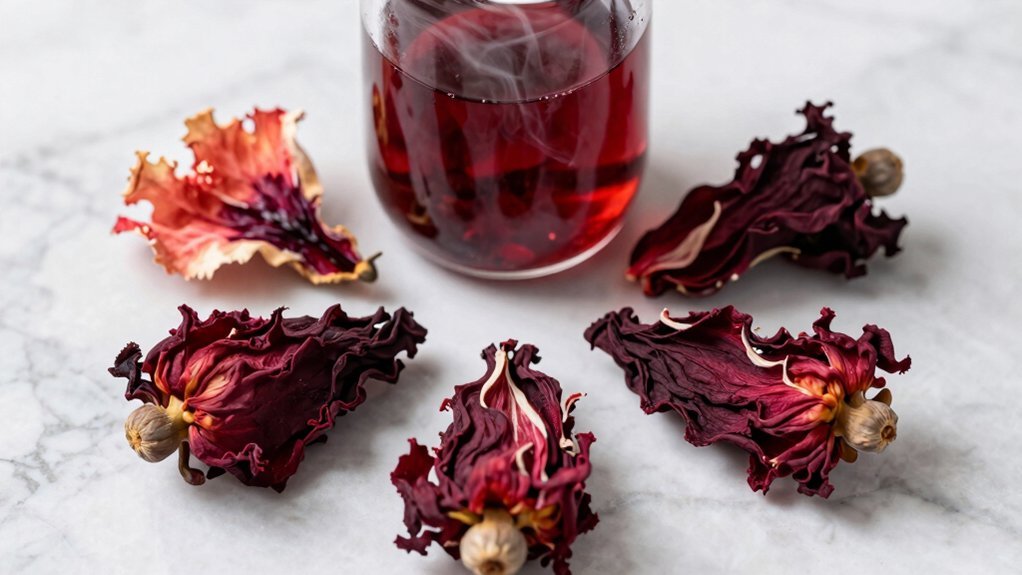

Leave a Reply